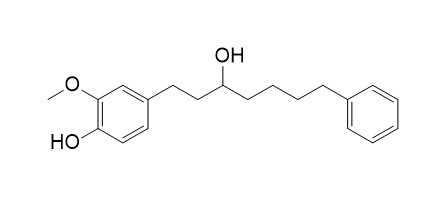Oxyphyllacinol
Oxyphyllacinol has antidiarrheal activity.Oxyphyllacinol has been shown to treat dementia.
Oxyphyllacinol was isolated from the S. nodiflora water fraction, while the S. nodiflora water fraction has been shown to have antioxidant and anti-aging activities, inducing mitochondrial activity and increasing ctt1 gene expression by regulating stress tolerance response.
Inquire / Order:
manager@chemfaces.com
Technical Inquiries:
service@chemfaces.com
Tel:
+86-27-84237783
Fax:
+86-27-84254680
Address:
1 Building, No. 83, CheCheng Rd., Wuhan Economic and Technological Development Zone, Wuhan, Hubei 430056, PRC
Providing storage is as stated on the product vial and the vial is kept tightly sealed, the product can be stored for up to
24 months(2-8C).
Wherever possible, you should prepare and use solutions on the same day. However, if you need to make up stock solutions in advance, we recommend that you store the solution as aliquots in tightly sealed vials at -20C. Generally, these will be useable for up to two weeks. Before use, and prior to opening the vial we recommend that you allow your product to equilibrate to room temperature for at least 1 hour.
Need more advice on solubility, usage and handling? Please email to: service@chemfaces.com
The packaging of the product may have turned upside down during transportation, resulting in the natural compounds adhering to the neck or cap of the vial. take the vial out of its packaging and gently shake to let the compounds fall to the bottom of the vial. for liquid products, centrifuge at 200-500 RPM to gather the liquid at the bottom of the vial. try to avoid loss or contamination during handling.
Molecules.2022, 27(22):7887.
Anticancer Res.2014, 34(7):3505-9
VNU Journal of Science: Med.& Pharm. Sci.2022, 38(2):2588-1132.
Pharmaceutics.2021, 13(2):187.
Nutrients.2024, 16(7):965.
J Chromatogr B Analyt Technol Biomed Life Sci.2020, 1149:122123.
Tumour Biol.2015, 36(12):9385-93
Appl. Sci.2022, 12(4), 2032.
Development.2024, 151(20):dev202518.
Biol Pharm Bull.2018, 41(11):1685-1693
Related and Featured Products
J Pharm Biomed Anal . 2014 Aug;97:166-77.
Identification of known chemicals and their metabolites from Alpinia oxyphylla fruit extract in rat plasma using liquid chromatography/tandem mass spectrometry (LC-MS/MS) with selected reaction monitoring[Pubmed:
24879483]
Alpinia oxyphylla (Yizhi) capsularfruits are commonly used in traditional medicine. Pharmacological studies have demonstrated that A. oxyphylla capsularfruits have some beneficial roles. Besides volatile oil, sesquiterpenes, diarylheptanoids and flavonoids are main bioactive constituents occurring in the Yizhi capsularfruits. The representative constituents include tectochrysin, izalpinin, chrysin, apigenin-4',7-dimethylether, kaempferide, yakuchinone A, yakuchinone B, Oxyphyllacinol and nootkatone. Their content levels in the fruit and its pharmaceutical preparations have been reported by our group. The nine phytochemicals are also the major components present in the Yizhi alcoholic extracts, which have anti-diarrheal activities. However, the fates of these constituents in the body after oral or intravenous administration remain largely unknown. In the present study, we focus on these phytochemicals albeit other concomitant compounds. The chemicals and their metabolites in rat plasma were identified using liquid chromatography/tandem mass spectrometry with selected reaction monitoring mode after orally administered Yizhi extract to rats. Rat plasma samples were treated by methanol precipitation, acidic or enzymatic hydrolysis. This target analysis study revealed that: (1) low or trace plasma levels of parent chemicals were measured after p.o. administration of Yizhi extract, Suoquan capsules and pills to rats; (2) flavonoids and diarylheptanoids formed mainly monoglucuronide metabolites; however, diglucuronide metabolites for chrysin, izalpinin and kaempferide were also detected; (3) metabolic reduction of Yizhi diarylheptanoids occurred in rats. Yakuchinone B was reduced to yakuchinone A and then to Oxyphyllacinol in a stepwise manner and subsequently glucuronidated by UDP-glucuronosyl transferase. Further research is needed to characterize the UDP-glucuronosyl transferase and reductase involved in the biotransformation of Yizhi chemicals.



